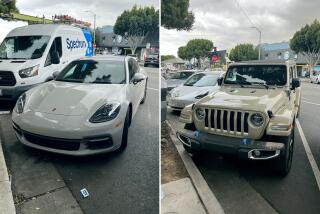Those Oddball ‘70s Cars: Even They Have Their Fans
- Share via
My first car was an orange Ford Pinto hatchback. I’d wanted something cool like a Honda Civic. But that was back in the ‘70s when Dad was still paying my bills and insisted I drive an American-made auto, no matter how goofy it looked.
Consequently, I spent a couple of years driving around in what I thought looked like a mobile pumpkin and what could have been fatal in a rear-end collision.
Never did I imagine that the day would come when the Pinto and some of its ‘70s contemporaries would be considered valuable. But strange things happen. Those far-from-classic cars, many of which can make you wince just thinking about them, have become objects of desire for a select group of enthusiasts.
We’re not talking about the classically cool muscle cars that big-time connoisseurs collect. We’re talking the oddballs: American Motor Corp.’s Gremlin and its Space Age-looking bubble-top Pacer, Ford Motor Co.’s Maverick and Torino and General Motors Corp.’s Chevrolet Vega and Oldsmobile Omega, among others.
Frank Wrenick, co-founder of the AMC Pacer Club in Cleveland, which boasts 300 members worldwide, is accustomed to defending the much-maligned car.
“Our unofficial motto is ‘It’s better to be ridiculed than not talked about at all,’ ” says Wrenick, who owns 15 AMC vehicles, including a 1977 Pacer wagon he bought in 1993 for $2,500.
“It’s a cool car,” he insists. “It’s got great styling and design. It’s different from anything else you’ll ever see. It’s a cute, friendly-looking, chubby automobile.”
There are 15 million pre-1976 cars registered in the United States today, says McKeel Hagerty, president of Hagerty Classic Insurance in Traverse City, Mich. About 50% of them, he says, are considered collectible.
Hagerty, whose company insures 27,000 owners of 1970-79 vehicles, says nostalgia may explain why his company is insuring an increasing number of such cars.
“I suspect that the appeal of ‘70s cars may be more about the ‘70s than the cars themselves,” he says.
Says Craig Jackson, chief executive of the prestigious Barrett-Jackson Auction Co. in Phoenix: “When you collect cars, you try to relate to what you’ve always wanted or to what you wanted to own when you were young. Oddly, some people wanted those cars.”
Though these quirky models are attracting fans, they generally are snubbed by classic-car collectors.
“No auction company would specialize in them,” Jackson says.
“The American car industry was probably at its worst” when vehicles like the Pintos, Gremlins and Pacers were created, Jackson notes. “That’s the reason why the Japanese snuck up on us.
“All of a sudden we decided to make small cars--and we made the worst ones in the world for a few years.
“When I went to high school from 1974 to 1977, it was brutal out there looking at new cars,” Jackson recalls. “I didn’t want one of those new cars coming off the assembly line at the time. Man, those things were ugly.”
*
The oddball ‘70s cars don’t command high prices, nor do they constitute more than a tiny percentage of the old-car collector market, says Joe Molina of JMPR, a Woodland Hills-based automotive public relations firm.
CPI Ltd.’s “Value Guide to Cars of Particular Interest” lists the 1975-80 AMC Pacer at $1,500 to $4,750, depending on condition, and the 1971-75 Ford Maverick at $1,650 to $4,550.
Among serious collectors, ‘70s muscle cars are another story. A 1971 Plymouth Hemi ‘Cuda convertible, Jackson says, once sold for $400,000 at auction.
Nevertheless, car aficionados such as Mitch Braiman, curatorial assistant at the Petersen Auto Museum in Los Angeles, are drawn to the ugly ducklings of the era.
“I’ve always had quirky cars,” says Braiman, who owns and drives a 1977 Pacer wagon.
“Some of the younger people have never seen them, and they don’t know what it is. A lot of them have never even heard of American Motors Corp.”
Jeanne Wright cannot answer mail personally but responds in this column to automotive questions of general interest. Write to Your Wheels, Business Section, Los Angeles Times, Times Mirror Square, Los Angeles, CA 90053. E-mail: highway1@latimes.com.






